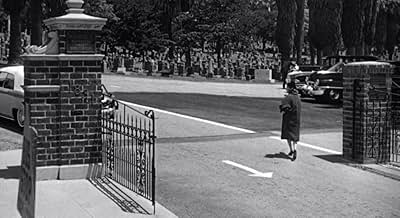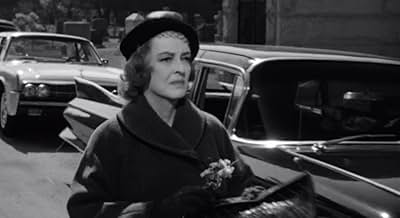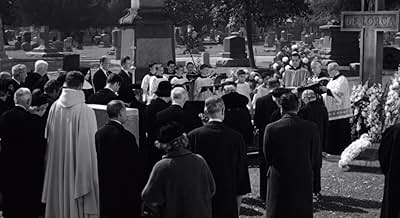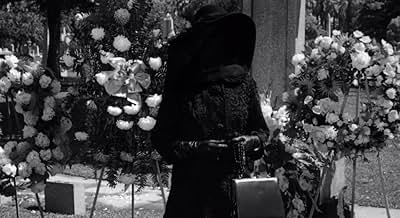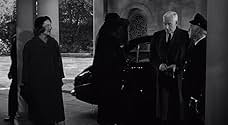IMDb RATING
7.3/10
7.1K
YOUR RATING
The working-class twin sister of a callous, wealthy woman impulsively murders her out of revenge and assumes her identity, but impersonating her dead twin is more complicated and risky than ... Read allThe working-class twin sister of a callous, wealthy woman impulsively murders her out of revenge and assumes her identity, but impersonating her dead twin is more complicated and risky than she anticipated.The working-class twin sister of a callous, wealthy woman impulsively murders her out of revenge and assumes her identity, but impersonating her dead twin is more complicated and risky than she anticipated.
- Director
- Writers
- Stars
Walter Bacon
- Juror
- (uncredited)
Brandon Beach
- Bar Patron
- (uncredited)
Henry Beckman
- Prosecutor
- (uncredited)
Perry Blackwell
- Electronic Organist in Bar
- (uncredited)
- Director
- Writers
- All cast & crew
- Production, box office & more at IMDbPro
Featured reviews
Through out the years many critics have said that the movies that Bette Davis did during the 60's were bad and campy at best, I tend to disagree. While some of them were not the best movies, Davis was always her best in them. Davis couldn't give a bad performance.
DEAD RINGER is a good movie with a good script and veteran actors doing what they do best. Definitely a good way to spend a Sunday afternoon.
DEAD RINGER is a good movie with a good script and veteran actors doing what they do best. Definitely a good way to spend a Sunday afternoon.
...even when some of those small things are not so small. 20 years ago Edith Phillips was going to marry wealthy Frank DeLorca. The wealth didn't really matter to Edith, but it mattered to her twin sister Margaret. It mattered so much that she slept with Frank and then announced she was pregnant, so Frank married Margaret out of obligation. There is still a shred of production code left, so I am explaining more than the film does. Edith has never forgiven Margaret for taking Frank away from her, but I'd say Frank does share some blame too since he must have slept with her.
So in modern day, which is where the film actually starts, Frank has died and Edith goes to Frank's funeral. This is where she finds out by the offhand remark of the DeLorca chauffeur that there never was a child. Margaret lied to both Frank and Edith to get the life of ease she wanted. In Edith's personal life she is about to lose the bar she runs because of back rent. She does good business but she is too generous for her own good. But that generosity does not extend to Margaret. Margaret, not knowing that Edith suspects the fake pregnancy business, goes to visit her in her apartment. After making double doggone sure that there never was a baby by getting Margaret to confess, Edith kills Margaret, changes outfits with her, dumps a suicide note in Margaret's lap that is supposedly written by Edith, and goes to take up Margaret's life as a DeLorca where she left off.
The thing is, what she really wanted that Margaret had - Frank - is dead, and the rest of it is rather empty without him. Plus there are any number of things to trip her up, starting with the fact that she knows none of the servants, does not know her way around the DeLorca mansion, and does not know Margaret's routine or friends. On top of this Margaret had a boyfriend on the side who is not exactly a catch - an obvious fortune hunter played by a rather fat and flabby Peter Lawford. And he is blackmailing "Margaret" and for good reason. Complications, some very ironic, ensue.
Davis still has it as she convincingly plays the working class Edith, the pampered Margaret, and Edith masquerading as Margaret quite convincingly. Karl Malden is quite touching as Edith's cop boyfriend. He has two possible endings to Edith's story, neither which is flattering, and he doesn't know which to believe. The jazz band playing over Edith's killing of her sister and covering it up adds to the tension of the scene.
I'd recommend this one.
So in modern day, which is where the film actually starts, Frank has died and Edith goes to Frank's funeral. This is where she finds out by the offhand remark of the DeLorca chauffeur that there never was a child. Margaret lied to both Frank and Edith to get the life of ease she wanted. In Edith's personal life she is about to lose the bar she runs because of back rent. She does good business but she is too generous for her own good. But that generosity does not extend to Margaret. Margaret, not knowing that Edith suspects the fake pregnancy business, goes to visit her in her apartment. After making double doggone sure that there never was a baby by getting Margaret to confess, Edith kills Margaret, changes outfits with her, dumps a suicide note in Margaret's lap that is supposedly written by Edith, and goes to take up Margaret's life as a DeLorca where she left off.
The thing is, what she really wanted that Margaret had - Frank - is dead, and the rest of it is rather empty without him. Plus there are any number of things to trip her up, starting with the fact that she knows none of the servants, does not know her way around the DeLorca mansion, and does not know Margaret's routine or friends. On top of this Margaret had a boyfriend on the side who is not exactly a catch - an obvious fortune hunter played by a rather fat and flabby Peter Lawford. And he is blackmailing "Margaret" and for good reason. Complications, some very ironic, ensue.
Davis still has it as she convincingly plays the working class Edith, the pampered Margaret, and Edith masquerading as Margaret quite convincingly. Karl Malden is quite touching as Edith's cop boyfriend. He has two possible endings to Edith's story, neither which is flattering, and he doesn't know which to believe. The jazz band playing over Edith's killing of her sister and covering it up adds to the tension of the scene.
I'd recommend this one.
Among her contemporaries Bette Davis is the only one I know who managed to carry off playing twin sisters twice in films. The first time was in A Stolen Life and in 1964 she did it again in Dead Ringer. The first time she was a good and a bad twin, but in Dead Ringer both twins commit evil acts during the course of the movie.
Bette's former co-star Paul Henreid directed her in Dead Ringer with co- stars Karl Malden and Peter Lawford. Back in the day one twin stole the man the other was in love with because he was rich, prosperous, and part of old California society. That one got rich, the other never married and now lives owning a bar that she's way behind in debt with.
When the husband dies the bar owner learns that back in the day he was tricked into marriage with a false pregnancy story and as the family was Catholic he married her and couldn't divorce. That sets the bar owner into a murderous frenzy and she kills the widow and then assumes her place while she also fakes a suicide story.
With a few bumps along the way Bette settles into the other Bette's life. Then a lowlife boyfriend played by Peter Lawford comes back in the picture. Lawford is a gigolo/golf pro and he and society Bette have some deep secrets. The rest you can see for yourself.
Oddly enough A Stolen Life also involved a twin taking another's place and as for the rest of the story, if you know what happens in The Postman Always Rings Twice you know what happens here.
With the possible exception of Whatever Happened To Baby Jane, Dead Ringer maybe Davis's best film of the Sixties. She throws herself into both roles so well that it like watching twins in action. She also has a nice group of supporting players in roles they are well cast in. But this one is Bette's show.
Watch her steal another life.
Bette's former co-star Paul Henreid directed her in Dead Ringer with co- stars Karl Malden and Peter Lawford. Back in the day one twin stole the man the other was in love with because he was rich, prosperous, and part of old California society. That one got rich, the other never married and now lives owning a bar that she's way behind in debt with.
When the husband dies the bar owner learns that back in the day he was tricked into marriage with a false pregnancy story and as the family was Catholic he married her and couldn't divorce. That sets the bar owner into a murderous frenzy and she kills the widow and then assumes her place while she also fakes a suicide story.
With a few bumps along the way Bette settles into the other Bette's life. Then a lowlife boyfriend played by Peter Lawford comes back in the picture. Lawford is a gigolo/golf pro and he and society Bette have some deep secrets. The rest you can see for yourself.
Oddly enough A Stolen Life also involved a twin taking another's place and as for the rest of the story, if you know what happens in The Postman Always Rings Twice you know what happens here.
With the possible exception of Whatever Happened To Baby Jane, Dead Ringer maybe Davis's best film of the Sixties. She throws herself into both roles so well that it like watching twins in action. She also has a nice group of supporting players in roles they are well cast in. But this one is Bette's show.
Watch her steal another life.
DEAD RINGER stretches credibility, but is an enjoyable little thriller. The story opens in 1964 Los Angeles where financially struggling Edith (DAVIS) goes to the funeral of wealthy twin Margaret's husband, Frank DeLorca. The two sisters have not seen each other for 20 years because Edith had originally been dating Frank, and Margaret stole him away from her claiming pregnancy. Margaret invites Edith back to her home after the funeral and once there, insults her by offering her cast off clothing. A quarrel ensues where Edith accuses Margaret of never having loved Frank and therefore denying both Frank and Edith of true happiness. In a huff Edith leaves in Margaret's chauffer driven Cadillac. While talking to the chauffer during the ride home, Edith learns that the pregnancy ploy that Margaret had used years before was a lie. When Edith arrives at her small bar in a seedy part of town, she is confronted by her rental property agent, who informs her that since she is 3 months behind in rent, he wants her gone. The one bright spot in Edith's life is the friendship that she has with Sergeant Hobbson (KARL MALDEN). In fact he remembers her birthday and gives her a watch, but Edith is so consumed with her problems that she is almost oblivious to his being there. In her apartment above the bar, now angry at her sister and somewhat irrational, Edith devises a plan to have Margaret visit, at which time she will murder her and take on her identity. Edith phones Margaret and orders her to come to her bar with the ruse that she "knows everything". Margaret goes, believing that Edith has some other knowledge. In an interestingly filmed manner, Edith manages to shoot her sister, change clothes, and make it look as though "Edie" has committed suicide. She now leaves in "Margaret's" chauffered car and steps into a grand life. Only now, she'll have to contend with pulling it off. Physical resemblance aside, Edith must now adopt "Margaret's" lifestyle. She must also convince everyone in "Margaret's" orbit from household servants to friends to Tony Collins (PETER LAWFORD), Margaret's lover, that she is Margaret. Worse, Sergeant Hobbson starts snooping around and unearths alot of things. Things that were not intended to come to light...... Former DAVIS co-star PAUL HENRIED stays within the guidelines with his job as the film's director. He should not have used daughter MONIKA HENRIED as Margaret's maid. Her delivery is flat, and apparently in her early twenties looks more like a young woman of means than a personal maid. JEAN HAGEN is light and airy as shallow friend Dede Marshall, ESTELLE WINWOOD is very good as annoying relative Dona Anna. PETER LAWFORD is also very good as the suave and slimy aging stud muffin Tony Collins. KARL MALDEN is tender in his early scenes, then all business in his latter ones. BETTE DAVIS is excellent playing 2 very different sisters. Her mannerisms and delivery are clearly separate depending on which role she is in. She's down to earth and practical as the down on her luck Edith. As the frivilous Margaret, DAVIS is coy and somewhat flighty, dismissing away what displeases her with a wave of her hand. This is a signature performance of DAVIS, and she runs with it, pulling out all the stops along the way !!!
Bette Davis plays twin sisters, one glamorous, the other homely, in this tale of deception, betrayal, and murder. What makes the story so fascinating is its delicious irony, as the homely sister, Edith, becomes ever more ensnared in her own tangled web.
The story is marred slightly by some obvious contrivances and plot holes. But it has lots of twists and turns. And Bette Davis, with her memorable voice, her gestures, and those Bette Davis eyes renders the Edith character engaging, as she realizes something important that she had not foreseen, and then makes an effort not to be found out. It's all about the internal tension of faking a false identity.
Much of the plot is consumed in detail, as we watch Edith squirm and fret when confronted with small tasks like switching clothes with a corpse, faking a signature, or determining the combination to a wall safe. These action details are somewhat tedious. But they give Davis lots of opportunity to act.
The film's B&W cinematography is fine. The split screen technology wherein both sisters appear together in the same scene is rather self-conscious, but was quite advanced for its time. Rear screen projection is another technique that is used, but seems primitive by today's technical standards. The film's lighting is quite good.
The film gets off to a really good start with a snazzy, and very Hitchcockian, title sequence accompanied by Andre Previn's excellent original score. The film's supporting cast includes Karl Malden, Estelle Winwood, and Jean Hagen. But, though they are all credible in their roles, this film belongs to Bette Davis. It's her show. And a viewer's response to the film will hinge largely on their impression of Bette Davis and her ability to play two roles. Personally, I think she did a splendid job.
The story is marred slightly by some obvious contrivances and plot holes. But it has lots of twists and turns. And Bette Davis, with her memorable voice, her gestures, and those Bette Davis eyes renders the Edith character engaging, as she realizes something important that she had not foreseen, and then makes an effort not to be found out. It's all about the internal tension of faking a false identity.
Much of the plot is consumed in detail, as we watch Edith squirm and fret when confronted with small tasks like switching clothes with a corpse, faking a signature, or determining the combination to a wall safe. These action details are somewhat tedious. But they give Davis lots of opportunity to act.
The film's B&W cinematography is fine. The split screen technology wherein both sisters appear together in the same scene is rather self-conscious, but was quite advanced for its time. Rear screen projection is another technique that is used, but seems primitive by today's technical standards. The film's lighting is quite good.
The film gets off to a really good start with a snazzy, and very Hitchcockian, title sequence accompanied by Andre Previn's excellent original score. The film's supporting cast includes Karl Malden, Estelle Winwood, and Jean Hagen. But, though they are all credible in their roles, this film belongs to Bette Davis. It's her show. And a viewer's response to the film will hinge largely on their impression of Bette Davis and her ability to play two roles. Personally, I think she did a splendid job.
Did you know
- TriviaAs Karl Malden's police sergeant character leaves his desk, he calls for a colleague named "Sekulovich" to toss him his hat. "Sekulovich", in fact, is Malden's birth name.
- GoofsEdie's framed "first-earned dollar" from her cocktail lounge has an inscription dated "New Years 1957" but the signature on the dollar bill is from JFK's Secretary of the Treasury, who did not begin until 1961.
- Quotes
Margaret DeLorca: [to her identical twin sister Edith] You shouldn't smoke. It's bad for your skin. I gave it up years ago.
- ConnectionsFeatured in Stardust: The Bette Davis Story (2006)
Details
- Release date
- Country of origin
- Languages
- Also known as
- La Mort frappe trois fois
- Filming locations
- N Figueroa St & W Temple St, Los Angeles, California, USA(Exteriors. As Edie's Bar. Demolished and redeveloped.)
- Production company
- See more company credits at IMDbPro
Box office
- Budget
- $1,200,000 (estimated)
- Runtime
- 1h 56m(116 min)
- Color
- Aspect ratio
- 1.85 : 1
Contribute to this page
Suggest an edit or add missing content


